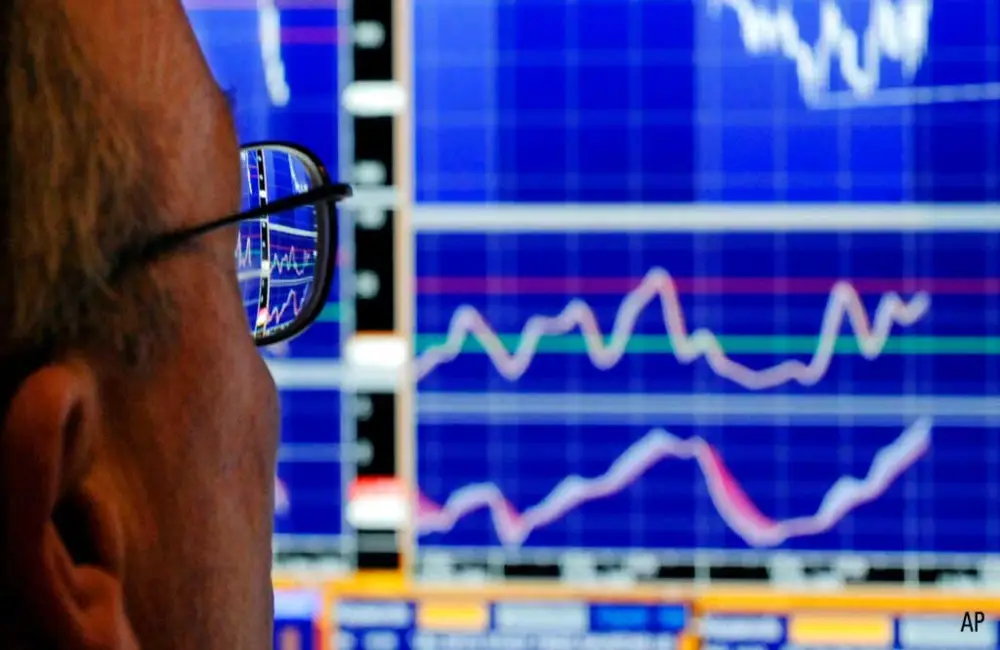US investors are fretting about the state of the US economy as big businesses warn of rough times ahead.
ASX futures were flat and at 7:00am AEDT on Monday were down 2 points to 6737.
US stocks closed lower on Friday as investors grappled with corporate warnings that have hit increasingly close to home for the health of the US economy.
Big employers like Goldman Sachs Group Inc. announced plans to slash jobs in the past week, deepening fears of a looming recession. FedEx warned late Thursday that it is closing facilities to combat weakening demand, and General Electric said that supply-chain problems are hurting profit.
The news weighed on stocks, and the Dow Jones Industrial Average shed 139.40 points, or 0.5%, to 30822.42. The S&P 500 fell 28.02 points, or 0.7 percent, to 3873.33. For the week, the Dow slipped 4.1 percent and the S&P 4.8 percent.
The Nasdaq Composite fell 103.95 points, or 0.9%, to 11448.40. It was down 0.7% on the day and 5.5% for the week, its biggest weekly decline since June. All three indexes are lower during four of the last five weeks.
In commodity markets, Brent crude added 0.6 per cent to $US91.35 a barrel, gold rose 0.6% to US$1,675.06.
Yields on local 2 Year Australian Bonds are up at 3.16% and 10 Year Australian Bond yields are at 3.72%. In foreign markets, the 2 Year US Treasury note yielded 3.87% and the 10 Year US Treasury note was 3.45%.
The Australian dollar was left little changed at 67.17 US cents. The Wall Street Journal Dollar Index, which measures the greenback against 16 other currencies, dipped to 101.50.
Asia
The Shanghai Composite Index dropped 2.3% to 3126.40, the Shenzhen Composite Index lost 2.3% to 2005.60 and the tech-heavy ChiNext Price Index was 2.3% lower at 2367.40. Brokerage companies were the top losers. The industry fell out of bed after they demanded lower financial services fees in a new government paper, which could impinge upon brokerages’ earnings. East Money Information was down 11%, and BOC International fell 6.0%. Coal producers and construction companies were also among the biggest decliners, with Zhengzhou Coal Industry & Electric Power tumbling 7.1% and Zhejiang Construction Investment dropping 5.7%.
Stocks in Hong Kong slumped at the close, continuing a hectic pattern of trading that has come to define the week. The benchmark Hang Seng Index finished down 0.9% at 18761.69. It was mainly Chinese property developers that led the losses, as the property sector pulled back from a sharp rebound on Thursday spurred by multiple government signals of support for the industry. One of the session’s biggest gainers, Country Garden, plunged 7.6%, while Longfor fell 2.9%. On the upside, Macau casino stocks rolled higher as investors awaited the latest results of a license tender. Sands China added 3.8% and Galaxy Entertainment rose 2.0%.
Stocks in Japan closed lower as electronics stocks fell amid lingering fears of aggressive Fed tightening. Tokyo Electron Ltd. fell 4.3% and Keyence declined 3.7%. Bank stocks, meanwhile, finished higher on the heels of the gain in US Treasury yields. Resona Holdings gained 3.6 percent and Sumitomo Mitsui Trust Holdings added 1.8 percent. The Nikkei Stock Average declined 1.1% to 27567.65.
Europe
European stocks dropped last week. UK and European Markets The pan-European Stoxx Europe 600 was 12.13 points or 2.89% lower to 408.24, the German DAX was down 346.95 points or 2.65% to 12741.26, and, the French CAC 40 Index finished reduced by 135.03 points or 2.17% to 6077.30 closing the week.
London's FTSE 100 lost 0.6% as retail sales in the U.K. tumbled 1.6% in August, pushing the pound to its lowest levels against the U.S. dollar since 1985, CMC Markets UK analyst Michael Hewson wrote in a note.
"The U.K. economy is slowing down--retail sales recorded a steep fall in August--and inflation is very high and B.of E.'s ongoing tightening (we look for +50bp, to 2.25% interest rate on Thursday) is to little to help," Unicredit forex strategist Roberto Mialich said in a note.
The day’s sharpest fallers were InterContinental Hotels, which closed 4.7% lower, with Dechra Pharmaceuticals and DS Smith falling 4.5% and 3.3%. Ocado Group was the biggest riser on the day, ending 3.2% higher, followed by M&G and Hikma Pharmaceuticals, which both closed up 2% and 1.8%.
North America
U.S. stocks ended lower on Friday as investors grappled with a warning from a major US company that claimed an increasingly dour outlook on the health of the US economy.
Goldman Sachs Group Inc. and other major corporations got ready to slash jobs in the last week, adding to recession fears. FedEx warned late Thursday that it is shuttering sites to balance dropping demand, and General Electric said that supply-chain issues were cutting into profits.
The news weighed on stocks, sending the Dow Jones Industrial Average down 139.40 points, or 0.5%, to 30822.42. The S&P 500 fell 28.02 points, or 0.7 percent, to 3,873.33. For the week, the Dow fell 4.1 percent, and the S&P. dropped 4.8 percent.
The Nasdaq Composite fell 103.95 points, or 0.9%, to 11448.40. It dropped 5.5% for the week, the most since June. All three of the indexes are lower four of the last five weeks.
The big moves are somewhat surprising in part because US stocks seemed to be on the rise earlier this summer, rebounding from mid-June’s losses on the back of earnings that weren’t as bad as anticipated and some positive hiring data. But investors who had hoped that the midsummer snapback was the start of a fresh bull market rally were brought back to reality when data on Tuesday showed that inflation remains stubbornly high.
Investors now expect the Fed will need to continue raising rates aggressively, potentially to the point that it tips the economy into a recession. Futures bets indicate that traders assign a 76% probability that the Fed will raise rates by another 0.75 percentage point at its meeting next week, according to CME Group. Investors are also factoring in a second identical rate rise in November.
Ahead of Tuesday’s inflation reports, some money managers had been looking for central banks to begin tapering rate increases.
“It’s obvious that they’re not going to pivot. That ship has sailed,” said Hani Redha, a portfolio manager at PineBridge Investments.
Traders are additionally anxious that the Fed will keep providing juice even if the economy slows.
FedEx, a bellwether for the broader economy, said on Thursday that its revenue for the quarter missed its projections. And it said it was closing offices and grounding its aircraft to account for plunging volumes of packages being sent around the world. Shares fell $43.85, or 21 percent, to $161.02 Friday. That was its biggest percentage drop ever, according to Dow Jones Market Data.
The revenue miss was “a clear negative” and heightened concerns about how companies could fare in the months ahead, Mr. Redha said.
Corebridge Financial Inc., the life insurance and asset-management unit of American International Group, priced its initial public offering earlier this week, a rare try at a big, conventional I.P.O. in the United States in months. The deal priced at the low end of expectations and dropped in its stock-market debut, disappointing underwriters who were looking to the deal to breathe life into a moribund IPO market.
























